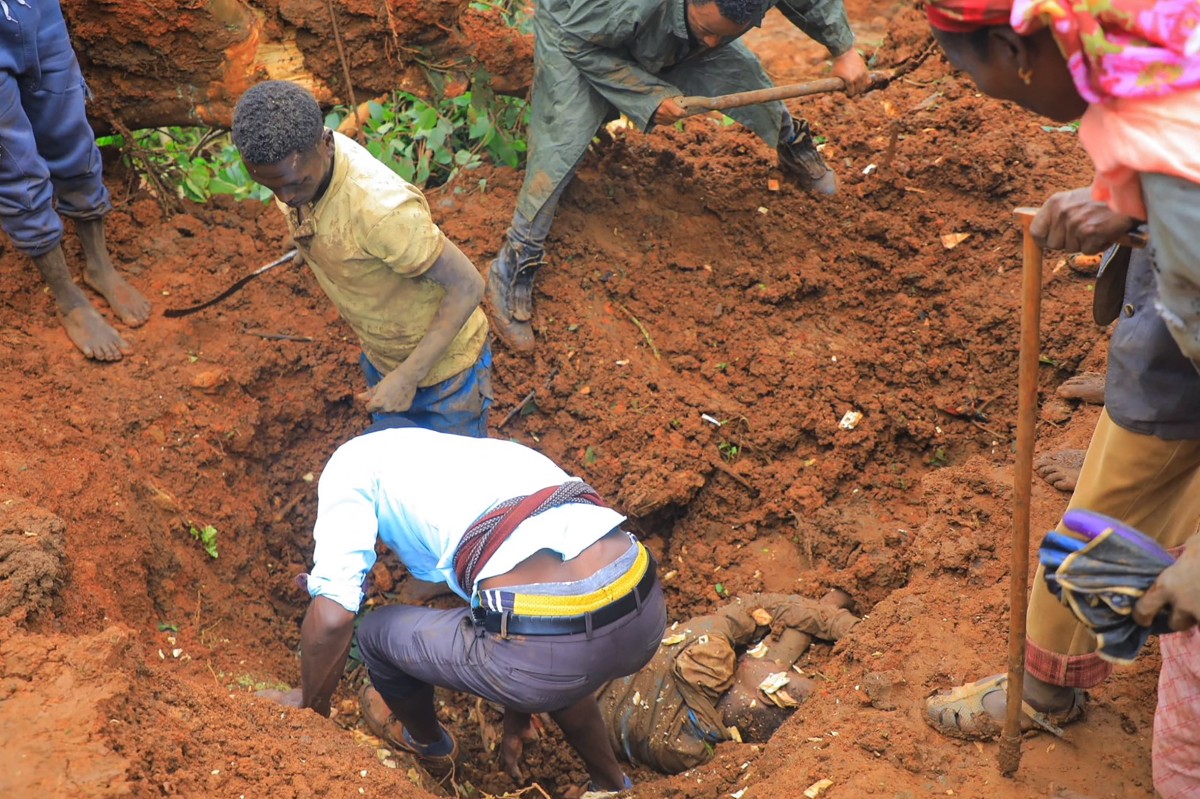Using shovels or their bare hands, local residents on Tuesday searched desperately for survivors after a landslide in a remote area of southern Ethiopia killed at least 229 people, the deadliest such disaster recorded in the Horn of Africa nation.
Crowds gathered at the site of the tragedy in an isolated and mountainous area of South Ethiopia regional state as some people clawed through mounds of red dirt, according to images posted on social media by the local authority.
So far, 148 men and 81 women are confirmed to have lost their lives after the disaster struck in the Kencho-Shacha locality in the Gofa Zone on Monday, the local Communications Affairs Department said in a statement.
Five people had been pulled alive from the mud and were receiving treatment at medical facilities, the government-owned Ethiopian Broadcasting Corporation reported earlier.
“Initially, four households were affected by the landslide, and later households in the area were mobilised to save lives,” Firaol Bekele, early warning director at the Ethiopian Disaster Risk Management Commission (EDRMC), told AFP.
“But they too perished when the landslide engulfed them,” he said, adding that the disaster was caused by heavy rains that had battered the area on Sunday night.
EBC quoted local administrator Dagemawi Ayele as saying that among the victims were the locality’s administrator as well as teachers, health professionals and agricultural professionals who had rushed to help.
Images posted on social media by the Gofa authority showed residents carrying bodies of the dead on makeshift stretchers, some wrapped in plastic sheeting.
Ethiopia, the second most populous country in Africa with around 120 million people, is highly vulnerable to climate disasters including flooding and drought.
“I am deeply saddened by this terrible loss,” Ethiopian Prime Minister Abiy Ahmed said on X.
“Following the accident, the Federal Disaster Prevention Task Force has been deployed to the area and is working to reduce the impact of the disaster.”
– ‘Hearts and prayers’ –
African Union Commission chief Moussa Faki Mahamat said “our hearts and prayers” were with the families of the victims.
“We stand in strong solidarity with the people and Government of Ethiopia as rescue efforts continue to find the missing and assist the displaced,” he said on X.
Gofa is located in the South Ethiopia regional state, roughly 450 kilometres (270 miles) from the capital Addis Ababa, though the distance takes around 10 hours to drive.
“The area of the disaster is rural, remote and very mountainous,” said an Ethiopian refugee living in Kenya who is from a district located near the site of the disaster.
“The soil in that area isn’t strong, so when heavy rains and landslides happen, the soil immediately runs down to the ground below,” he told AFP in Nairobi.
“This isn’t the first time this type of disaster has happened. Last year in a similar disaster more than 20 people were killed and before that almost every rainy season people die because of landslides and heavy rains in that area.”
The South Ethiopia state had already been battered by the seasonal rains between April and early May, causing flooding and mass displacement, according to the UN’s humanitarian response agency OCHA.
It said in May that floods affected more than 19,000 people in several zones, displacing over 1,000 and causing damage to livelihoods and infrastructure.
In 2016, 41 people were killed in a landslide following heavy rains in Wolaita, also in South Ethiopia.
In 2017 at least 113 people died when a mountain of garbage collapsed in a dump in the outskirts of Addis Ababa.
The deadliest landslide in Africa was in Sierra Leone’s capital in Freetown in August 2017 when 1,141 people perished.
Mudslides in the Mount Elgon region of eastern Uganda killed more than 350 people in February 2010.

